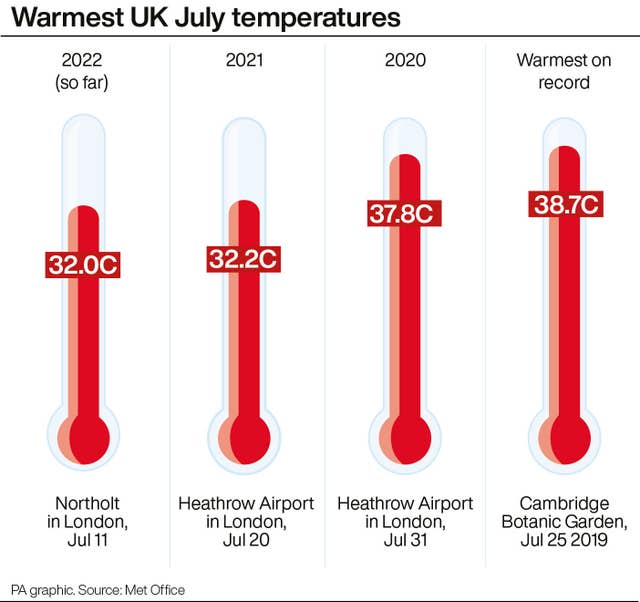Met Office extends amber warning for dangerous and disruptive extreme heat
Much of England and Wales will see temperatures soar into the 30s from Sunday to Tuesday.

The Met Office has extended its amber warning for a potentially deadly heatwave.
The warning for extreme heat for much of England and Wales is now in place from Sunday until the end of Tuesday, with the hot spell expected to peak on Monday or Tuesday.
The Met Office said: “Population-wide adverse health effects are likely to be experienced, not limited to those most vulnerable to extreme heat, leading to potential serious illness or danger to life.”

Widespread disruption, including road closures and cancellations and delays to rail and air travel are also possible, as temperatures look set to soar into the mid-30s or above.
Forecasters believe there is a 30% chance the mercury could pass the current UK record of 38.7C (101.7F), set in Cambridge in 2019, while temperatures are set to reach 34C in parts of the Black Country and Shropshire next Tuesday.
The heatwave is a result of hot air flowing to the UK from the Continent.
Heatwaves have been made hotter, longer and more frequent by climate change, and experts have warned of the need to adapt homes and cities in the UK for a future of more intense – and deadly – summer heat.

Ambulance services are already on the highest level of alert as difficulties with the hot weather combine with Covid-19 absences among staff and ongoing delays handing patients over to A&E.
London Ambulance Service urged the public to support it as the heat continues by only calling 999 in the event of a life-threatening emergency, keeping hydrated and staying out of the sun during the hottest periods of the day.
The Royal Life Saving Society UK warned people about the dangers of trying to cool off in lakes, quarries, rivers and other waterways in the extremely hot weather.
Hot weather can put a strain on the heart and lungs, with older people, those with pre-existing health conditions and young children particularly at risk.
It can cause dehydration, heat exhaustion or even heatstroke, and affect the ability to work or concentrate.
People are being encouraged to try to keep their homes cool, for example by closing blinds or curtains and keeping bedrooms well ventilated at night, drink plenty of fluids, avoid too much exercise, and stay out of the sun during the hottest part of the day.
In some areas, the heatwave comes in the wake of months of below-average rainfall, and water companies are urging households to save water, as demand surges in the face of the high temperatures.





